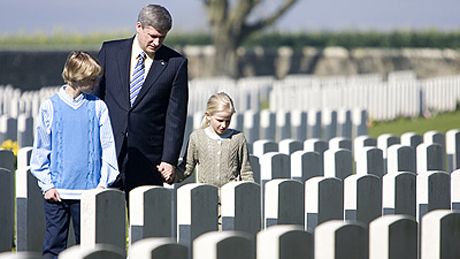Features
You are here
The battleground of history

June 21, 2013
Stephen Harper knows it: to promote Canada as a Warrior Nation on the world stage, from Afghanistan to Mali, you need history on your side.
From the $30 million wasted on War of 1812 commemorations, to the untold millions to be wasted in four years of celebrating the senseless butchery of WWI through Canada's “victory” at Vimy Ridge, with $12 million spent along the way to promote “Canadian history” to children by funding classroom visits by veterans and serving soldiers—Tory history is military history. And to ensure this is the only version we get, the Tories are slashing funding of federal archives and historic sites.
1812 & WWI
The truth behind the glorious hype is that in both 1812 and WWI, a young Canada was cutting its imperialist baby teeth by backing the most vicious imperialist power in the world at the time: Great Britain. And the glory stories also disguise an ugly history of colonial oppression at home.
In 1812, First Nations people were pitted against each other with a promise of protection that never materialized from either Britain or the US. Some nations felt they were faced with a more immediate threat from US settlers and chose Britain as a lesser evil in the short term. Britain’s final reward for this support was the treaty of Ghent, which in ending the war dropped the demand for a neutral First Nations territory. On the other hand US settlers who chose to cross the border into Ontario as United Empire Loyalists were awarded for their loyalty with land to till—stolen from First Nations.
While Harper casts 1812 as the foundation for Confederation in 1867, it actually laid the foundation for rebellion first: in Upper Canada (Ontario) and Lower Canada (Quebec) in 1837 and 1838. People who had sacrificed in the war were not prepared to put up with the same old oppression and exploitation. Francophones in the Lower Canada rebellion were, in fact, inspired by the radical republican ideas of the American Revolution.
And the history that will be edited out from Harper’s celebration of WWI will be that of the hundreds of Quebecois who hid in the woods and were hunted down to be forced into the military, and of the thousands of ordinary people in Quebec who demonstrated against conscription and even burned down RCMP and military recruiting stations while singing “O Canada”—which was not an anthem to the state then, but to the people. This rebellion was put down by an army battalion from Toronto, and the rebels were conscripted into an entirely francophone brigade. Since then, opposition to imperialist war has been higher in Quebec than anywhere else in Canada, including in the era of Iraq and Afghanistan.
Rewriting history
The Harper Tories have an interest in denying why the Quebecois and First Nations see history differently. Heritage Minister James Moore recently complained, "We have young Canadians who don't know about Canada's past, who don't know from where we've come, who don't know the possibilities we have in the future, and the privileges that they have in being able to call themselves Canadian."
So they are spending $12 million on promoting military history while starving alternative sources of history. They are remaking the Museum of Civilization in Ottawa in their own image, renaming it the “Canadian Museum of History”, which will celebrate the “great events” of war and the “great men” of politics. The current museum shows a history of Canada made by ordinary nameless people through their labour and struggle and rebellions, struggle that has often involved moments of unity across national and ethnic lines.
There is also a battle raging over history in schools. In May the Tories tried to introduce a study of how history is taught from primary to post-secondary, using Parliament's standing committee on Canadian Heritage. They backed off after some protest and instead will focus their inquiry on questions of military history. The Heritage Committee has promised to “undertake a thorough and comprehensive review of significant aspects in Canadian history...with an emphasis on battles such as Vimy Ridge, the Second World War, including the Liberation of Holland, the Battle of Ortona, Battle of the Atlantic, the Korean conflict, peacekeeping missions, constitutional development, the Afghanistan conflict, early 20th century Canada, postwar Canada, and the late 20th century.” The committee will seek out “witnesses’ testimony, including firsthand accounts of significant periods,” prompting McGill historian William Straw to ask, “Are we going to rewrite Canadian history by committee?”
During that same week Quebec Native Women presented a petition to the Quebec National Assembly, asking that the realities of aboriginal life be made a compulsory course of study in high school. It was supported in the Assembly by the two elected representatives from Quebec Solidaire, which supports self-determination for both Quebec and First Nations.
Who will win on the battleground of history itself?
We have to fight for a peoples’ history of Canada that acknowledges the reality of colonialism, imperialism and national oppression—and also the potential to resist it. That is the history of Métis leader Louis Riel, whose hanging was protested most loudly in Quebec. That is the history that Idle No More has revived and is bringing to life again with Sovereignty Summer.
And while Quebec appears to have come a long way from the conquest on the Plains of Abraham, it wasn’t until the Quiet Revolution of the late 60s that to be francophone in Quebec no longer meant being a second-class citizen: without the right to French as your language of work and used as cheap labour.
This legacy explains why the post-secondary participation rate in Quebec is lower than in Ontario, despite having the lowest fees in the country. But the struggle against this legacy produced access to education in French, and the fact that this is such a recent and hard-won right is why it is so valued as a social good—and why the Quebec student movement has been strong enough to maintain a tuition freeze for the better part of forty years, up to the incredible Quebec Spring of last year.
There is much reason to hope that the people’s history will prevail. A recent online poll conducted by Nanos Research for the Institute for Research on Public Policy asked what types of historic events Canadians believe the federal government should spend time and money marking, including the War of 1812.
Only about three out of every ten Canadians supported the government in actively encouraging the celebration of 1812 and only about 15 per cent of Canadians felt more patriotic as a result of the celebrations. The Queen’s Diamond Jubilee was not high on the list, nor was the fortieth anniversary of the 1972 Canada-Russia hockey series, and only 23 per cent said they support the government’s plans to mark the two hundredth birthday of Sir John A. Macdonald in 2015.
What were the historical events favoured by most people? The thirtieth anniversary of the Charter of Rights and Freedoms (last year) and the hundredth anniversary of women’s suffrage in 2019.
With time that list will come to include Idle No More and the Quebec Spring. This will be the history that young Canadians will find truly worthy of celebration.
Section:










